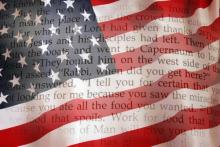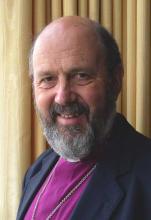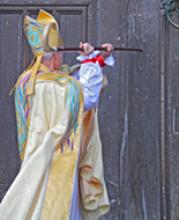N.T. Wright

HBO’S BIGGEST POST-APOCALYPTIC SHOW, The Last of Us, imagines a brutal world — and the mushroom zombies are only occasionally the source of danger. The first season followed Joel (Pedro Pascal), as he escorted teen Ellie (Bella Ramsey), who is immune to the zombie infection, to a hospital that can turn her immunity into a cure. In the final episode [SPOILERS], Joel and Ellie reach their destination. But when Joel learns they can only manufacture the cure by killing Ellie, he kills the doctor who was set to operate on Ellie. Joel’s decision raises the question: If the world can only be saved by sacrificing the innocent, is it a world we want to save? The Last of Us, itself an adaptation of a beloved video game, is far from the first show that employs apocalypse to interrogate our morality. Our end-time imaginings can show us who we are ... and who we could be.
The Greek title of the last book in the New Testament canon is Apokalypsis (“apocalypse”), the best English rendering of which is “revelation.” Revelation isn’t about the end of the world. It’s about a revelation — an unveiling. Revelation is one example from the genre of books we call apocalyptic literature. The genre, popular among Jews and Christians for hundreds of years before and after Jesus’ life, usually features a human receiving a message from some sort of divine messenger. The messenger wants to show the listener some deeper truth about the world — something that helps the audience participate more faithfully in the new world God is bringing forth.

People have often said to me, “If Paul came back today, what would he be most shocked at in today’s church?” And I say, unhesitatingly, our disunity — not just the fact that we’re not united, but the fact that we don’t care.

Both religion and politics are concerned with how we should organize societies. Yet the tendency for Christians has often been to begin with the politics and work backwards to find religious rationale for our political beliefs. As a result, most people read the Bible not to challenge our deeply held beliefs, but to affirm the decisions we've already made with our lives.
If you tend toward the political right you might say the chief political concern of the Scriptures has as much to do with smaller government, lower taxes, individual freedoms and gun rights as any explicit Christian concept.
If you tend toward the political left you might believe the chief political concern of the Scriptures has more to do with reproductive rights, religious pluralism, big government and labor unions.
Too often the ideologies of the secular right or the political left have been allowed set the terms for religious Christians.

The oft-cliched Christian notion of heaven -- a blissful realm of harp-strumming angels -- has remained a fixture of the faith for centuries. Even as arguments will go on as to who will or won't be "saved," surveys show that a vast majority Americans believe that after death their souls will ascend to some kind of celestial resting place.
But scholars on the right and left increasingly say that comforting belief in an afterlife has no basis in the Bible and would have sounded bizarre to Jesus and his early followers. Like modern curators patiently restoring an ancient fresco, scholars have plumbed the New Testament's Jewish roots to challenge the pervasive cultural belief in an otherworldly paradise.
The most recent expert to add his voice to this chorus is the prolific Christian apologist N.T. Wright, a former Anglican bishop who now teaches about early Christianity and New Testament at Scotland's University of St. Andrews. Wright has explored Christian misconceptions about heaven in previous books, but now devotes an entire volume, "How God Became King: The Forgotten Story of the Gospels," to this trendy subject.

The real Dunder Mifflin Paper Co., the goods and evils of the pepper-spraying cop, N.T. Wright's fiery predecessor, the belt of the Virgin Mary closes Russian tour, Parker J. Palmer, and more.
I've been told that I am obviously not a Christian because I watch movies. Because I believe women can be pastors. Because I don't take Mass in a Catholic church. Because I've read Brian McLaren and N.T. Wright. Because I voted for Obama. Because I am not a Calvinist.
I need to find something to do until Sept. 13 or thereabouts. The Daily Show is on a three-week vacation until then. (Anyone have a good home remedy for the Stewart Shakes?) I kid.
It is often pointed out that some of the places most lacking in hope are not the industrial wastelands or the bleak landscapes shorn of beauty, but the places where there is too much mo